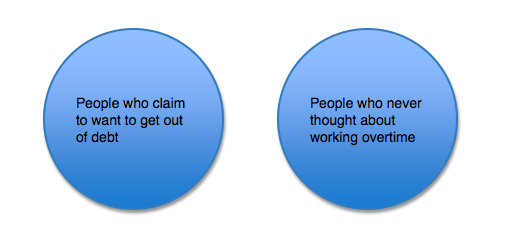Believe us, we’d rather not cite all these rotten examples. We’re sincere: we’d much prefer it if we could show you more people to emulate than to deride. But not only do the latter outnumber the former, it seems to be an inescapable rule of the universe that they always must.
There’s a regrettable phenomenon among the financially semi-aware that’s worse than hyperfrugality, and almost as bad as whining about self-inflicted and pointless debt. It’s rationalizing away reduction (and diminished fortune.)
Last week the New York Times ran a first-person opinion piece by Graham Hill, founder of both LifeEdited.com (“Design your life to include more money, health and happiness with less stuff, space and energy”) and TreeHugger.com, which is what it sounds like. (Recent headlines include “‘Don’t frack my mother,’ sing Artists Against Fracking” and “Test-drive: Ford C-MAX Hybrid vs. Toyota Prius V”.)
Hill lives in a 420-ft² Manhattan apartment, and feels so righteous about doing so that it’s the opening line of his piece. He wasn’t always so virtuously minimalistic:
in the late ‘90s…flush with cash from an Internet start-up sale, I had a giant house crammed with stuff — electronics and cars and appliances and gadgets.
Did he willingly jettison all that “stuff”, or did circumstances do it for him? Hill doesn’t say, but he does see advancement and accumulation as inherently negative:
My life was unnecessarily complicated. There were lawns to mow, gutters to clear, floors to vacuum, roommates to manage (it seemed nuts to have such a big, empty house), a car to insure, wash, refuel, repair and register
We here at CYC aren’t big fans of lawns ourselves – xeriscaping is less work and better suited to our regional climate – but millions of people love them and accept their upkeep as necessary. As Hank Hill (no relation) would tell Graham, the light yard work is its own reward. For those who’d rather not bother, well, that’s what Manhattan is for. Same deal with regard to the car.
And “floors to vacuum”? That lament is ludicrous for 2 reasons: first, as ascetic as Graham Hill is today, presumably he still has floors. Second, talk about your 1st World problems. Hey, Cambodian villagers: the rich American white man is complaining about the hassle of having to plug in his magic machine that effortlessly makes debris disappear.
Also, we’d love to know how his roommates feel in retrospect about being under Graham Hill’s “management”. Furthermore, look at the cause and effect. He takes on the unwanted responsibility of too big a house (for him), then complains about the subsequent problems of his own creation that follow the purchase of the house.
A message for Graham Hill, and more importantly, for all y’all:
POSSESSIONS ARE AWESOME. Looking around the room right now, we see a coffeemaker. If you’re not familiar, you spend a few seconds filling it with water and coffee grounds, press a button, and coffee shortly appears. No picking, roasting, shipping, grinding, nor distilling required on our part. We just spend a few pennies per serving and enjoy.
There’s also a TV, modestly sized as these new ones go. At barely an inch thick it’s as unobtrusive as possible, and it entertains us for hours on end. Yes, that’s a lousy deal.
Furniture to sit on. Appliances to keep food cool or hot as required. Drawers to prevent us from having silverware and dishes, which together eliminate much of the mess of eating, strewn about haphazardly. Forgive us for considering this shameless mass consumption to be better than the alternative. But from our perspective, there isn’t a single possession we can see that doesn’t make life markedly better.
However, possessions can also be wastes of money. You’re not going to believe this, but it depends on the possessions. The CYC principals have enough money to live comfortably, and do, but part of living comfortably is not having a dysfunctional relationship – or any “relationship” – with what one owns.
There isn’t any indication that (products for sale make) anyone any happier; in fact it seems the reverse may be true.
His lemma is provably false. Anyone reading this who has ever driven a new car, or moved into a new house, or even bought a new article of clothing, felt at least temporarily happier than he or she did a minute earlier. Graham Hill was an early internet millionaire, cashed out in 1998, but before getting racked with guilt did what impetuous nouveaux riches do:
To celebrate, I bought a four-story, 3,600-square-foot, turn-of-the-century house in Seattle’s happening Capitol Hill neighborhood and, in a frenzy of consumption, bought a brand-new sectional couch (my first ever), a pair of $300 sunglasses, a ton of gadgets, like an Audible.com MobilePlayer (one of the first portable digital music players) and an audiophile-worthy five-disc CD player. And, of course, a black turbocharged Volvo. With a remote starter!
The most important word in that curious passage is the first important one: “celebrate”. If you’re possessed of a truly wealthy mentality, you don’t buy a house that requires 4 descriptors because you want to “celebrate”. You do it because you:
- Need a place to live.
- Can afford it and make it cash flow. Obviously most primary residences don’t generate income in and of themselves, but the idea is to live somewhere that doesn’t make you poorer month-to-month. If you do, you’re buying too much house.
- Want to set yourself up for appreciation. (Or, you’re so rich that you don’t care. Laurene Jobs’s ostentatious and impractical residence isn’t ever going to be easy to sell, but she doesn’t worry about it. Her house could be annihilated by antimatter, which insurance doesn’t cover, and it’ll barely affect her net worth.)
Remember what we said about possessions being awesome? This post is being written on a $1500 computer that’s thin, portable, fast, aesthetically gorgeous and largely free of bugs. That sounds expensive, but no other laptop can do what it does as efficiently and sleekly. And cheaply.
Meanwhile, Graham Hill paid 20 times what he should have for an item whose sole purpose is to shield your eyes from the sun. As we tweeted last month:
Oh, don’t worry: we can afford the $250 Pradas. Which is exactly the point. #ControlYourCash twitter.com/CYCash/status/…
— Control Your Cash (@CYCash) February 4, 2013
Graham Hill didn’t just buy stuff: he bought liabilities. Things that serve only to make someone else rich (the local Volvo dealer, for instance) and that erode Graham Hill’s own wealth. Which he can’t see, because he’s too busy wasting money:
I hired a…personal shopper. He went to furniture, appliance and electronics stores and took Polaroids of things he thought I might like to fill the house; I’d shuffle through the pictures and proceed on a virtual shopping spree.
The CYC principals could probably afford a personal shopper (we’re not sure how much they go for, whether they take a portion of the proceeds or a salary, etc.), but don’t.
(My) life (was) cluttered with excess belongings.
Then why’d you buy them? And once you realized that, couldn’t you just sell them? Of course not. Why, when you can be didactic and tell the people without internet windfalls how they can live as austerely as you. Ultimately the crux of his complaint is ecological, but he throws in some Americacentric criticism of elbow room, too:
Our fondness for stuff affects almost every aspect of our lives… The average size of a new American home in 1950 was 983 square feet; by 2011, the average new home was 2,480 square feet… In 1950, an average of 3.37 people lived in each American home; in 2011, that number had shrunk to 2.6 people. This means that we take up more than three times the amount of space per capita than we did 60 years ago
Yes. IN THE 178th MOST DENSELY POPULATED SOVEREIGN NATION OR DEPENDENT TERRITORY (out of 243) ON EARTH. We’re not exactly Macanese here.
Look, Ace. Just because you and 1.6 million other misguided souls decided to cram yourselves onto a 23-square-mile island, that doesn’t mean the rest of us in the remaining 3,541,245 have to or want to apologize for our love of space. Then there’s the obligatory quote from an academic to give Graham Hill’s piece that patina of respectability:
In a recent study, the Northwestern University psychologist Galen V. Bodenhausen linked consumption with aberrant, antisocial behavior.
Let’s peek at Control Your Cash’s most recent credit card statement. (Business account, thank you. But they’re all business accounts.) We’ll try to compare our profligate spending habits to those of Graham Hill, and see where and if we can cut back. These are all the purchases from the past month, with the qualification that they were:
- for non-food items.
- for goods, not services, which means they could theoretically fall into Hill’s “excess belongings” category.
- over $20.
Let’s see…$179.48 for pet medications. But that’s an essential, unless we want feline blood on our hands.
$696.77 for a mattress. But that’s a business expense, because it’s going in a rental property. Renters like latex foam and a single-stage coil design. A threadbare mattress leads to an unoccupied unit.
$131.44 for a windshield wiper reservoir. The old one was leaking and beyond repair. Regardless of Professor Bodenhausen’s stern assessment, we fail to see a link between buying car parts and “aberrant, antisocial behavior.” Then again, we’re not that educated and have trouble operating on so advanced a level.
$25 for a blender.
Graham Hill can go die. Guilt is bad enough, misplaced guilt worse still. Misplaced guilt that’s supposed to inspire commiserative guilt in others is worst of all.
Today, Graham Hill operates on a higher plane. Here’s his variant on the platitude about “experiences” being better than “stuff”:
Aside from my travel habit — which I try to keep in check by minimizing trips, combining trips and purchasing carbon offsets
With the possible exception of “combining trips”, 3 of the 3 actions he undertakes to mitigate the harm he inflicts on Mother Gaia are moronic. Read the first one. He likes to travel, but tries not to travel. And now, instead of spending money on expensive sunglasses, Graham Hill takes that same money and flushes it down a (solar-powered, composting) toilet.
Does this really need explaining? Buy stuff that gets you ahead: or as we call it, “assets”. Buy lots of them. Buy nothing else. Even a $15 toaster might not meet our strictest definition of an asset in that it’s probably not going to appreciate for future resale, but owning one beats holding your bread over a fire pit every morning.
The flip side of the equation is to sell liabilities, or at least not buy them. Graham Hill bought nothing but liabilities, then complained about how they impoverished him (definitely financially, and also spiritually, he seems to say.) There’s no more efficient way to get poor.











